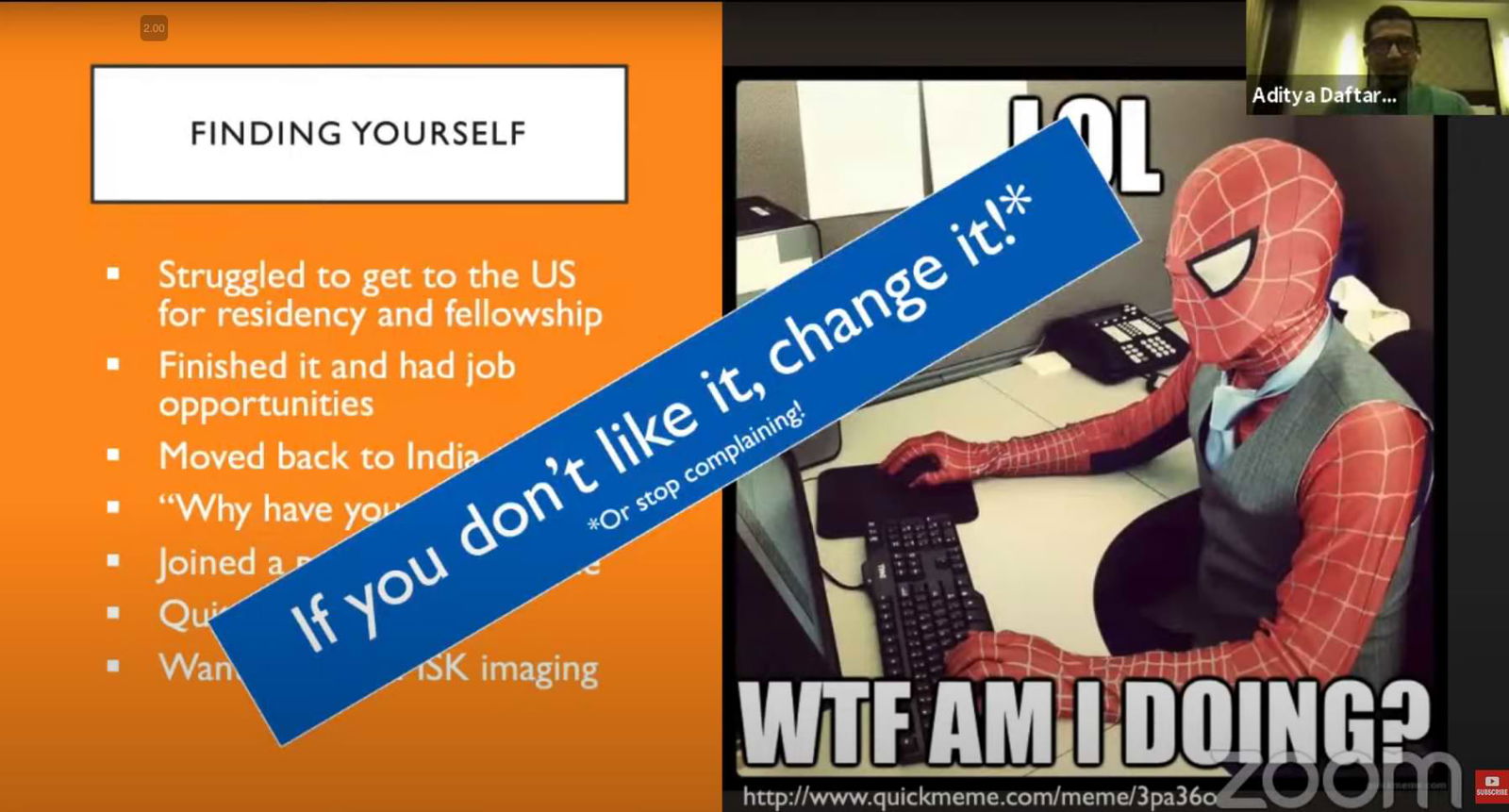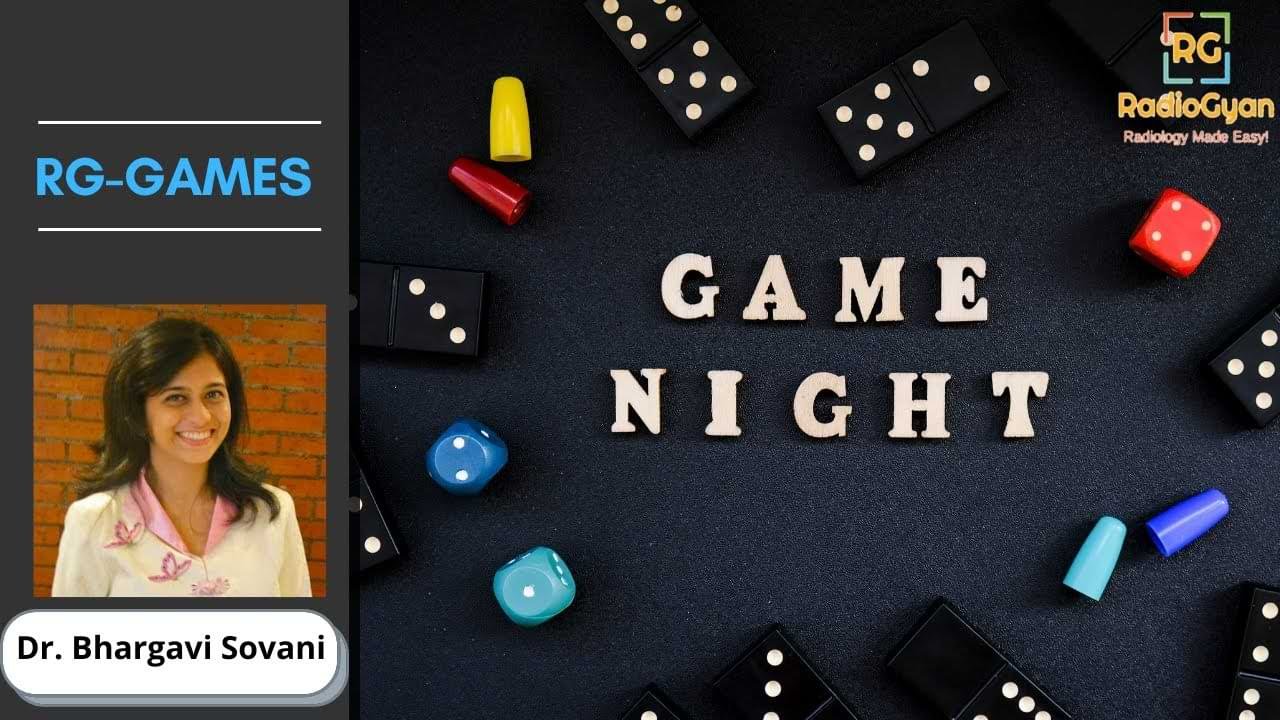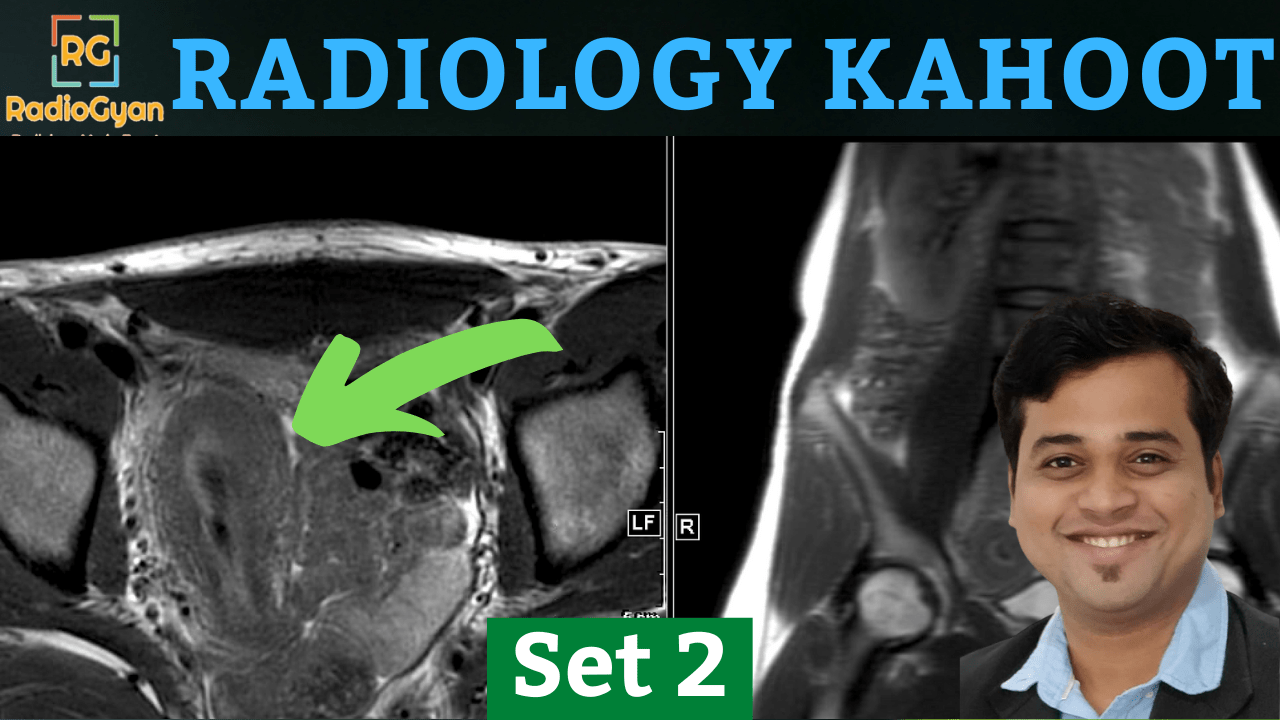
Dr. Aditya Daftary shares in this radiology discussion video about the importance of being true to oneself and finding happiness by making a positive impact without depending on others’ perceptions of success. He emphasizes the significance of pursuing passions and individuality while educating patients and colleagues about medical imaging. Dr. Daftary also shares tips on achieving fulfillment, creating a positive work environment, balancing professional and family life, and making small but impactful changes to improve healthcare. Furthermore, he discusses a new interactive online course in radiology that provides learners with lectures, quizzes, live cases, and structured radiology forms. Finally, he emphasizes the responsibility of leaving the planet a better place for the next generation.
Transcript:
RADIOLOGY BEYOND THE DARK ROOM
Dr. Amar Udare: Hello and welcome to another radiology discussion session by Radio Gyan. Today’s session is the fourth episode of our Radiology Conversations Beyond the Dark Room series. In this series we explore aspects of radiology outside the dark room, although a lot of us are not aware of precisely what a darkroom is, that does make for a catchy title. Our guest today is Dr. Aditya Daftary a musculoskeletal radiologist practicing in Mumbai India. He is also one of India’s leading radiology entrepreneurs. The one thing that I like about Dr. Daftary is the way he is always an unapologetic self and not afraid to try anything different or “hatke” as you would see. So, without any further ado, I will ask Dr. Daftary to start sharing his presentation.
Dr. Aditya Daftary: Thanks very much for having me here. It’s nice to be able to chat with everybody remotely even though we can’t see anybody, but this is normal for radiologists, we talk to people without seeing them all the time so that’s fine. Is my screen projecting fine and my voice across, okay?
Dr. Amar Udare: Yes.
Dr. Aditya Daftary: Okay. I can go ahead and get started, again thank you very much for having me here. It’s fantastic great stuff that you guys are doing, you seemed to have made fabulous inroadsinto the entire radiology community and when I mentioned this all my fellows, were very much like of course if you want to do anything you should send it to Radio Gyan and you get all over the place.
Dr. Aditya Daftary: So, my talk today is called stay hungry stay foolish it’s easy for me because I’m always hungry and foolish so it’s a standard thing that I do. So, the premise of this talk, why am I giving this talk and the reason I get to give talks like this is that somebody thinks I’m successful. I’m going to go through questioning that a bit over here, so let’s just for a moment look at what we call success. When we think about success, we always say success is conventionally defined as the accumulation of financial and emotional currency but emotional currency far exceeds financial currency and is very dependent on the financial currency.
Dr. Aditya Daftary: There are some set low-risk paths to success that we call careers. Careers are built by some board of education to achieve qualifications that are defined by others in other words some board of education has decided that, this is the test that you must pass to become qualified for X, this is the qualification for getting into why, this is the qualification for completing why. So, these are all careers that are built by achieving different qualifications right and the qualifications most importantly have been defined by somebody else. They are also standardized because they need everybody to be able to follow the past, they need to standardize them. So, you know these are the rules this is the box you have color the box and then you move on to the next thing.
Dr. Aditya Daftary: So how do you become successful? We become successful because we achieve standardized qualifications. We set ourselves on course for a career and will continue to collect more and more qualifications and that’s what helps us to grow in our career and then by growing in a career we gain financial currency. When others see our financial currency to some extent, they admire us and give us emotional currency because we feel good that people appreciate us and now that makes us officially successful. And what are we successful at? We are successful at making ourselves happy by making others happy with us. Kind of weird and complicated.
Dr. Aditya Daftary: What if we don’t achieve standard qualifications? What if we fail to set up a course for a career? What if we failed to collect more qualifications? What if we fail to grow our so-called careers? What if we fail to gain financial currency? Others won’t see it; they won’t give us the emotional currency and that makes us official failures. What do we fail at? We fail because we are deriving happiness by making others happy with us and this is very important if you think about it. Our success depends on the way others perceive us and this is considered to be normal in my mind I consider this called normalities, it is the process of incessantly acquiring standardized qualifications to achieve success as defined by others.
Dr. Aditya Daftary: I am not successful by any stretch of the imagination you know my mum begged my school principal to take me and I mean she literally she said this boy is admirable in this kindergarten and she sat outside his office for a few hours till I got in.
I consistently stood middle of class, and every single report card I got said can do better and that was just one of the courses. I made it into an inter-school team and I played every sport but I didn’t get anywhere in any of them. I got into college and Medical College was the last name on the list, I deserved a smacking. I got these scores and I think today they won’t let you enter the United States with these scores and I took four years to get into radiology residency in the USA I was like sort of applying rejected, applying rejected, applying rejected.
Dr. Aditya Daftary: The question is why I have asked to give this talk. It’s because I am a radiologist, I trained in the US, I moved back to India, and I wanted to do multimodality MSK imaging. I didn’t have any money for a scanner and I said I won’t do kickbacks. So, I had this dream stay hungry, stay foolish which was quoted by Steve Jobs and I discovered that instead of Steve Jobs, was more like no jobs there was nothing in it.
Dr. Aditya Daftary: This is a bit of my story I am not sure if there are any lessons you can learn from it but it’s a and if not anything else you hear it and can have a good laugh about it. So, let’s talk a little bit about the start, development, growth, and where we are now. So, one of the things is I struggled like hell to get into a residency and fellowship in the US. I finished it I had job opportunities to stay on but I just decided to move back to India because that’s something I wanted to do.
Dr. Aditya Daftary: Here I got the standard questions. Why have you moved back? You didn’t get your green card or your wife must want you to come back that’s why you are coming back and the truth of the matter is none of those answers. I just wanted to come back enjoying the great paying teleradiology practice and I quit it in 2 years because I wanted to do musculoskeletal imaging. I think one of the things that’s important about all our journeys is that we need to find ourselves. You need to do something and you need to be able to do realize what it is, realize whether it is you, it isn’t you, how much of it are you. I think this is sort of the biggest thing. You are sitting at an office dressed like Spider-Man in a suit in front of a computer then it’s not your job you’re supposed to be swinging on buildings and you’re supposed to be saving the planet and you shouldn’t be sitting in front of the computer doing crap like that. So, I think these are just some things that in your head you got to find out what you want to do so, find yourself, spend that time and if you don’t like it change it.
I have heard so many fellows’ residents just complain. ‘This is not good this is not there; this is not that.’ Just don’t tell me this is not there, tell me what you will do to make it better and focus on that, don’t focus on the negative focus on the positive. Stop complaining and just suck it up
Dr. Aditya Daftary: I think this is a very important thing. Stupid Lives Matter they’re very important. Stupid people are extremely important because they do stupid things and inherently stupid things lead to great things eventually except this one which you can see on the screen but let’s not go there. So, I decided to do MSK imaging and when I move back to India most people, I spoke to including radiologists asked what’s that. People told me who cares? well basically everybody does it. We all read Knee MRI, shoulder MRI. We don’t need somebody to read JUST musculoskeletal radiology and you will die hungry because you don’t have money for a machine you don’t have kickbacks and I think the key thing here is if you believe in something do it, no matter how stupid it sounds just do it that’s very important now depends on your stupidity I’m not going to get into that. If it’s truly an idea that makes sense you are young you have many years ahead of you, dive into something and see where it goes.
Dr. Aditya Daftary: A year or two of your life does not matter trust me. If you believe it, does it and you will get tonnes of advice, I mean just bucket loads of advice on what is rational what is practical, what is appropriate, what is good. If you want to do something just stop listening to those people because there are people who will just take you into that conventional world of conventional success that you don’t want to be in.
Dr. Aditya Daftary: Another important thing is, when I came back the problem nobody knew what I did. Nobody knew what musculoskeletal radiology was. I didn’t have any scanner access and I had no idea where I was going to get patients from but I also knew that people didn’t know what they needed. I would go back and look at MSK radiology reports and see that this is not musculoskeletal radiology. I also realise that there was a huge problem in the space of how people got the report, so you get your scan then you go the next day collect your MRI films and report and you take it back to the clinic. And I said this is just ridiculous this is like an obscene waste of time for everybody so we had to make things far more convenient. So then one of the things to do is to understand when you are starting, what is it about you that people don’t understand and what is the gap that you are hoping to fill. This is very important, so think of what’s missing and all you going to fill that void change thing.
Dr. Aditya Daftary: Often you think about it you don’t know where to begin so I didn’t like all of you so I had to find a friendly scanner first. But where can I find a friendly scanner which I’m not going to pay for? I happened to just go and have a conversation with the guys at NM and the CEO is a fabulous guy and he said you know we can make it happen. If you want to use our scanner that’s fine you can put your patients on our scanner and will let you scan and send you the images for reporting. Great! Where am I going to get patients from? So, I went around and talked to a whole bunch of orthopedic surgeons and I said listen I do musculoskeletal radiology, I might have a scanner that I can work with I don’t do kickbacks are you interested? And I was very honest and upfront and I was very fortunate I found some really good well recognized orthopaedic surgeons who said yeah, I mean would love to work with somebody like that I realized that we got the scanner, we got the people we just have to make it very easy for people to use the system
Dr. Aditya Daftary: So we said is go to any NM centre, get your scan done over there will be no additional charges for the system, centralized reporting and I would send us all the images we would still use Dropbox or whatever else just send the images and stuff in packs, save all the images, store then keep them with us and you tell the patients to go to the centre get your scanner printer films give you the CD in your hand you go home and buy you’ll get your report and your doctor will get the email simultaneously with your report.
So, it made life very easy for patients and doctors, doctors could say listen to this is plan A and this is Plan B you go get your MRI if your MRI says X then you come back here tomorrow for surgery if it says Y then this is the physio protocol go home and follow it. They just saw the report they called the clinic this is a report, you go back or you come tomorrow for surgery. So, they just basically made life easy for people.
Dr. Aditya Daftary: So just think of Solutions and I tell this to people all the time there are plenty of problems and people can wine moan and complain day in and day out but you do have to think of Solutions not problems. As we make plans don’t expect the plans to work but I shouldn’t stop you from planning. Now let’s just talk about the elephant in the room everybody works here, you have so many things that’s why you could do all of this. You have X or Y, you have money or you have whatever else but the truth of the matter is if you want to do something you have to plan for it anyway .so I had saved up some money from my last two maybe last New year or two of you just being able to survive rent, food or the rest of that. I did work multiple jobs at one point in time, and just to try and make things work I sorted out my time, I work long hours for a long time.
Dr. Aditya Daftary: For a long time, this is my friend Arjun Kalyanpuri teleradiology solutions ever since we always have a workstation whatever question you had you were working on it you found time. I remember so many workcation where we would go out of town, five o’clock in the morning you wake up and finish a report. I remember we wouldn’t go anywhere because we couldn’t find internet I have driven in Panchkini out of the house we were living in from a relative’s house onto the main highway just to find internet download cases report them and then come back to the house. You know we’ve done this for years and years and years which now we don’t necessarily have to do.
Dr. Aditya Daftary: Don’t refuse help you will get help from various quarters and fans will say let me give you something, the family will say let me give you a place we can give you a flat for rent we won’t charge you or Whatever something, you get help from a lot of quarters don’t be too proud to refuse help, always pay it forward you collect your help now paid for the next person you come across in your life. Whenever you’re taking favors and things from people remember to weight against the cost of your soul. What are you giving up from your consciousness somebody gives you something but means you have to give something later back. If you find that’s not something that you can accept then be careful.
Dr. Aditya Daftary: Let’s say for example for me if somebody was to say listen, I’ll give you a hundred cases to report today but give me 30% back, to me that was not something that was worth the weight of my soul. So, I said I’m not going to do that I don’t want a hundred cases you can please send them anywhere else you want but I don’t want to do it.
And in all of this, the key thing to remember is when you are doing something. How much do you need? What do you want and what are you willing to give up this dream, to pursue this dream? Address the elephant in the room in different ways and money matters if you want to do the crime you have to do the time. You’re going to have to work hard, work overtime, you are going to have to do all sorts of things in order to help yourself get that dream. You will have to scrounge and scrape and do all those things.
Dr. Aditya Daftary: Now this is literally how my practice started. I met the NM guys one afternoon, and the next morning at 7:00 I got a phone call. I have three patients where do I send them? I struggled and I called [unknown] and said I have got to get this scan done and he said to do it and we sent those three patients across and the scan got done by my protocol and the images were sent to me by whatever transfer mechanism was thereby downloaded them, send the report PDF documents and everything was done very quickly and efficiently. We got follow-up and were very happy with the reports, the image quality was great everything was in place right.
Dr. Aditya Daftary: So, when you find that you’re in a situation be aware and care because opportunity will knock, you need to open the door when it comes. But also important is that opportunity will knock many times each one of those knocks will not turn into anything but you still need to keep going opening the door as the dude Wala again closes it. The most important thing to always do is to wait. You need to have a lot of patience you are going to start doing things away and you shouldn’t get impatient at any time. I think this is important patience will bring patients.
Dr. Aditya Daftary: One thing that I drive home to people that I work with a lot of time is everyone wins if you put patients first. There are a lot of mitigating circumstances that make you do things that you don’t necessarily need to do and one of the rules that we follow for example in my practice is the ‘my mother rule’ So when reading something when you’re doing something and you’re thinking of taking a shortcut you think for a second you say.
If it was my mother, would I do that? And then the answer will be no and then you’ll just refocus your energy. So don’t scan just because you can scan although you had a CT scan somewhere you haven’t got it with you so we just repeat the scan. You don’t need to do that you can wait it’s not unless it’s a life-threatening emergency. We do interventions all the time I can tell you that I spend a lot of my time, I’m doing injections just telling people you don’t need an injection, you need to do something else, and they need to do physio. Don’t poke just because you can poke. So, in other words you know just because you have a hammer everything is not a nail you got to look at everything differently looking for the old images. I think this is a very important thing that many of us don’t.
Dr. Aditya Daftary: Think bang for the buck. If somebody’s come to you, how can you convert everything into an answer for them? so I think of solutions what are the answer that you would get with this. Give answers look at everything that’s there, and look at the price because.
I always have said billing has always been secondary. There are so many rewarding experiences in medicine that you don’t need to bill for and you will find out that your practice will grow very quickly. You see this with a lot of people with successful practices even in the conventional sense just not looking at billing, billing will come don’t worry people will come to you, and people will see you. We are at that stage where today at my practice people don’t allow me to Bill because I won’t bill. So always put patients first and make a big difference, so patients bring patients. Here it’s just actual patients, the better you are with patients the more patients will get.
Dr. Aditya Daftary: what happens is that shit happens so you just got to roll with it, things will happen. We started an ultrasound service which was at one side of Bombay and one of the other surgeons I worked with will send patients to me but only 50% of patients showed up. So I decided to start spending a day in those days where we had a portable ultrasound in his clinic just seeing patients as they came there and we had more patients show up because at the same time that they saw the doctor, they came and they had the scan with us but it wasn’t very busy but at that same time I learned a hell lot of orthopaedics because I saw as every patient was examined and I understood what the plan for every patient was. It made a massive difference to my total understanding of the disease and then that’s how I went on to become a part of Sportsmen. Things will happen you have to consistently evolve you have to change to adjust, you have to adapt and things will sort of work out slowly you feel you’re wasting time but you’re not wasting time you’re learning a lot of new things. If you don’t fail you won’t succeed. In every successful story everything that you get to, every point of fulfilment that you reach. You will have many points of unfulfillment and you just got to learn to absorb them pick yourself up, dust yourself off, and keep going.
Dr. Aditya Daftary: Now I like sports, so I watch sports and play sports I learn about the key people in sports whether it be orthopaedics, physiotherapist, players, and supporters’ people who support sports and it is very important if you have a particular area that you’re interested in. Live it, learn it, and understand every aspect of it. If you are a muscular skeletal radiologist and you don’t know the pain that an athlete goes through. When they cannot play a game, when they cannot train for a week, when they cannot train for a month, when they cannot train for a year, then you are not providing a perspective in your thought process of what’s happening. So, live what you love. If you’re trying to do something just live it in its entirety to maintain perspective on what you’re doing.
Dr. Aditya Daftary: Now this is a very important part it can be very difficult; some people are very lucky some people are not. I am unbelievably fortunate family support is extremely important. When you are going out to do something different, you realize that there are no set finite limits on how long you are going to be in this. I discussed with my wife saying I am going to leave this well-paying job for one year and I don’t know when I will find the next job. I am not happy and this is now what I want to do. I had 100% support and was like we will find something we will do it, leave it if it’s making you unhappy. Having family support is very important and also leave it. People get very impatient when we told you, they can take six months out that’s fine but after six months it is not working out then set a timeline to come back. Unfortunately, it doesn’t always work out that way in entrepreneurship when you’re doing your own thing. It’s your passion that drives you it’s your ability to say that you know I don’t mind if I’m making much less money but I’m happy. I don’t mind if I’m working longer hours but I’m happy and everyone else too says but you’re hurting just because that’s something you truly love and enjoy doing, showing family support is exceedingly important.
Dr. Aditya Daftary: You got to stay active so I just buy used to play squash I throw my meniscus, run my chondral wear, when I was told to go cycling so I started cycling, and today I love cycling I’ve been cycling through and it’s fabulous. So, keep active and keep doing things that are outside of medicine that is very important. Find like-minded colleagues and also, I’m very fortunate we have a bike group that consists of doctors also and not doctors. We have excellent colleagues at work we all understand the insanity that we work. We are always laughing and bubbling with joy. All our fellows come back and treat us like home so we say we can’t pay you but at least we can give you a good time. So that’s why I think I learned a very important thing on that front.
Dr. Aditya Daftary: I have plenty of non-medical friends and I think they bring the greatest thing about something there are so many parallels in various careers on how you can think how you can change things and it is fantastic to have those perspectives that you don’t get, to question you from the field that’s not theirs. For those of you who watch football people talking about how the British football team recently trained the English football team and part of it was that they got non-football coaches to help them with their thinking because if you put all the football experts think they’re still thinking the same way like football people need to have somebody from a completely different sport come in and bring a completely different perspective something that will make things change.So don’t forget life because it provides many insights into a lot of other things, so keep it real and don’t just be completely focused on it, most of you are, so far in your lives in medicine often from the time of your tuition to that net exam to finishing your residency that’s all you did. Make sure you have parallel lives and other things that you do.
Dr. Aditya Daftary: So today where am I? I am enjoying practice; I’ve got great colleagues and fantastic fellows. I meet great people at work every day. I want to stand-up comedy and that’s important, rinse and repeat, that could be stand-up comedy, it could be sports medicine it could be building software, it could be building a teaching program, could be anything else. Don’t be afraid to take something that you’re successful at, put it aside, and start something new because at the end of the day start again from zero. It’s not like you’ve never been there before you know what it feels like to be at zero and you can restart don’t get very attached try not to get very attached to what you’re doing, fine I can move on to something else.
Dr. Aditya Daftary: So, my rules for staying hungry and foolish. Finding yourself, do something stupid believe in yourself just go out and do it. Understand your space, what are you trying to solve how you trying to solve it, and what are the challenges. What are the opportunities? Think Solutions? Don’t get caught up in the problems, problems are plenty that’s what you’re there for, work on Solutions When any opportunity comes, be there but there will be many opportunities some may convert some may not but your job is to respond to them, wait you’ve got to be patient you start doing something you have to be patient to see whether it comes through.
Dr. Aditya Daftary: As far as medicine goes, I have to say patients first, there are numerous opportunities in healthcare and numeral investments in healthcare. You see them somebody is marketing a device; somebody is marketing a particular MRI sequence somebody’s getting a particular kind of coil. You think about it and often this is just a bloody marketing gimmick and so remember it is not going to help your patients so it is probably not a good idea to do that. Roll with It, you’ll have challenges keep adapting and adjusting to get into those and live what you love. If you like something just find out everything about it, don’t just focus on your particular area of it. Don’t forget that there’s life out there what you do outside of medicine affects you in many ways what you do in medicine .it allows you to think differently about a lot of other things. Never be afraid to rinse and repeat you have an idea you did it worked it didn’t work don’t feel afraid to say fine it didn’t work I just have to find something else so you know I’ll put that on the back burner and work on something else. But I have to say the biggest thing in all of this is to believe in yourself then I can tell you that all of you are incredibly intelligent people and if there is anybody to be believed in is all of you, so definitely just believe in yourself.
Dr. Aditya Daftary: So, we are just going back, conventionally success as we have discussed but what I am going to propose is something very different, don’t think of success anymore think of fulfilment. And fulfilment is defined as the accumulation of internal satisfaction it does not involve anybody else it’s a wonderfully selfish thing to be involved in. Internal satisfaction will come from you following your passions, following your passions means you’re being different. People don’t necessarily follow their passion they followed a side thing but when you bring your primary job to follow your passions you are going to be different. When you are different, people ridiculed you people will look at you differently people will not consider you successful in the conventional sense. If that’s what it takes to be different then learn to accept and embrace that finally being different allows you to make a difference and I think that sort of the most important thing is when your same the same you are not changing anything that anybody else got to. But when you start to be different Y you can make a really big difference.
Dr. Aditya Daftary: How do we achieve fulfilment? for fulfilment we allow ourselves to explore. We can take a year off; we can take time off we can do the things that we want to do. We can find perspective in ourselves, we find things that excite us, we don’t do something just for the sake of doing it we follow our passions we feel free to change the man passionate about this today. I’ve given it a good go; I am not very passionate about it right now I want to change something feel free to change s that don’t get caught up and sucked into the Vortex. Keep changing until you find meaning and purpose once you find out I’m doing this gives me meaning. Focus on redefining existing career paths. Excel at what you enjoy and then finally achieve fulfilment.
Dr. Aditya Daftary: By making ourselves happy with ourselves, that’s what we’re really trying to do and that is what we call evolution so we have to evolve from success and trying to fit and check somebody else’s check boxes, to something where we decide what the rules are what we will work around and how we will make a difference in this planet. So, this is sort of a summary video that I hope you guys enjoy with this is me. So, I will end with this. I say no to normalities I am fed up with somebody telling me what the rules are. I don’t think I am Dr. Aditya Daftary; I am who I am and I will be Popeye the Sailor Man. I am who I am and you are who you are and don’t let somebody else define who you will be or where you will go. I am going to end with that and if anybody has any questions or thoughts, I am happy to discuss them.
Dr. Amar Udare: Thank you, Aditya, that was an eye-opening talk. So much to learn from. I Had questions but you covered all of them. I think you thought of the talk from a listener’s perspective because everything I wanted to ask you covered most of it. I think one highlight of your talk was the perspective that is very difficult to teach. How does one get that? When you are talking about these dimensional paths that everybody takes. I have done that and I am still doing that. What needs to be done. How can we change that?
Dr. Aditya Daftary: So, the first thing is, I don’t think you should be guilty of taking the conventional path. I think oftentimes you are not taught to explore you are not given that liberty to explore and you find yourself bound down by different things so you don’t have that liberty to do those things, your mind has never been open to that. That being said I think the other important thing is that even in conventional jobs you can make massive differences. So, you can make massive differences just by looking at your workplace environment and saying just look at the way things don’t work around you and you have to start by making just small changes you can’t just wake up one day and say alright from tomorrow we going to be a fully automated fantastic radiology department going from X-Ray and having developers.
Okay let’s get exiled let’s get why, you got to start understanding what the problems are and you got to start thinking of what the smallest maximum impact change you can make, and for it to successfully make it a change that is very convenient and easy for everybody else to absorb as well it’s a lot there. Find what is your biggest problem find what is the one change that will make a massive difference to that problem but applied in such a way that it becomes very easy for everybody to you to adjust to change, so many small changes will lead to it and as you keep doing that also small successes will lead to other things.
Dr. Aditya Daftary: So I used to work with the radiologist he used to teach me , and he told me that he was in private practice and one of the things he did was he would tell me that one of the former heads of the section he would go to RSNA every year and he would find one thing that he decides to just change in their practice for the year Another thing that I find is excellent is in an academia we had two days a week where two people would come from private practice when I was in nuclear medicine and they brought some phenomenal perspective to what we doing so just look at your regular workspace around you you don’t have to go out and leave everything and become something and I’m trying just be the monk who sold his Ferrari or whatever else but you can just make small changes in in the place that you are that will make a massive impact going forward.
Dr. Amar Udare: That’s excellent advice about making the smallest possible but the most impactful change.
Dr. Aditya Daftary: The other thing is, we just learn to accept certain things. We accept that patients have to wait for their reports. Have you ever waited for your report? Do you know how horrible it is? To stand in the line and just say that’s acceptable but if somebody actually thought about it and said that’s horrific. We are treating people like animals and if you think about it in that sense and say this is not acceptable, then you will start thinking of ways to solve it but as long as it doesn’t strike you that it’s not acceptable then you will not solve it.
Dr. Amar Udare: That’s so true so many things you talk about seem so obvious but I don’t know what stops us from thinking about these things. It’s difficult to make those changes It’s so obvious but nobody thinks about it on their own, even in practice there are common problems with simple solutions like emailing the reports directly to the physicians makes so much sense and saves everybody time. I think it’s difficult to develop that but now that you’ve told us we will try to think along those lines.
Dr. Aditya Daftary: One of the greatest experiences for every physician is to go and be a patient in a healthcare system you are not a part of. So, you don’t know anybody there gets into the hospital go stand in the line go to the PDQ have something happen, get the blood test get everything else without knowing anybody and you will immediately realize what a hell hole healthcare is and all the changes that you need to make in it
Dr. Amar Udare: We have a comment from Dr. Gayatri who says that we should not attach happiness to a certain achievement, we should try to be happy every day and enjoy the journey rather making it an achievement. I don’t know if it’s a question but I think she is asking if should we be happy every day or be working towards achievement.? If I got it right
Dr. Aditya Daftary: I think the point over here is what do you define as achievement and that’s the key question. if I’m not thinking too much that I wake up every morning and I want to go to work now whether I want to go to work because of the quality of work because it’s the people at work because of the difference I can make. Those are all the different levels of achievement. And those are the things that I have set myself as a benchmark. Now if you set your achievements by saying I want to diagnose Hajdu Cheney syndrome today then Hajdu -Cheney syndrome doesn’t every day. So, I’m sorry you can’t have that as your achievement for the day. But you decide what you want to do, what will make you feel that I have made a difference today. It may be there okay; I want to turn the reports around faster. I want to make sure that we have a way that we get all the old studies back but I want to do it without shouting at the mama I want to do it by trying to convince the mama that this is something that we should do that kind of stuff. So, think I would say set yourself, set up a daily goal, weekly or monthly depending on the size, of how am I going to make a difference in my workplace in the next 1 month. Make it one project, it may be something as easy as I want to get rid of typographical error errors in reports. I want to get rid of short forms in reports and just see how you know it means something as stupid as that whatever irks you try and make it simpler.
Dr. Amar Udare: Great suggestion to work on the idea that you would like to change every month. Now that we are talking about it as an entrepreneur, I am sure you had difficult times and you had tough times with people. There are points where the person is not doing their work for example you mention the mama. You have told him 10 times your colleagues or subordinates and things are not being done. So how do you manage that? You have to maintain relationships and your inner peace is also important.
Dr. Aditya Daftary: So, the other people management skills that you need to explore. so, I’ll give an example of people that work for me, I have three admins they all have their individual strengths, and if I ask one to do something one may not do it while the other will do it depending on the type of job. I think it’s understanding the individual and often there is an alternative individual. So, you figure out who you’re going to empower in which way to do what and in general my feeling is any organization must work towards a point where everyone is dispensable. So, you will never have that crazy depends, that mama is not doing his job then it’s very easy to convince somebody else and say boss you do this job and I will give you more credit for doing it and can credit be an interesting thing. It is not all financial credit is also about motivating people to do it and this is something that may be slightly unreliable. I remember Don Reznik telling me about this when I bumped into him and he says, so we can’t pay our fellows but we give them a good time.
Dr. Aditya Daftary: So, you know I think the important thing is what makes you feel appreciated and what makes the person in your organization feel appreciated for what they’re doing and what you’re doing towards enhancing their career, enhancing their self-confidence, self-esteem. I think these are all things that need to be put in, it is not all financial. We look at things we just say so you know what it’s been a really bad week it’s Saturday let’s order pizza and that’s it, we do it. I only just hand over the phone and you say just order whatever the hell you want it doesn’t matter. Something you’ve got to remember those things. We had for many years Preloves, we just went out for dinner once a month with everybody and we going to try food just different types of food nobody sees them anyway just order it and stuff and we just make the workplace fun, make it fun and bring everyone together. I think even the conversation with the mama, say you’ve been doing this for so long let’s make a difference let’s make a change. Some way to excite the guy. Think about how you can appeal to a better side.There are better ways to get around it.
Dr. Amar Udare: Golden advice. I have been through that in an organization. For everyone in the American profession after a certain point money doesn’t matter about this small thing that imagining you.
Dr. Aditya Daftary: Tell me when you reach that point where money doesn’t matter.
Dr. Amar Udare: I have not reached that point yet but I hope you get my point. These things matter more than just the money part of it. You mentioned that family plays an important role and everybody comes from a different space and in our system, family does play a part. Not everybody is fortunate to have the kind of open-minded thinking and a broader perspective. At least my family did their part but they were busy with other things in life that’s how it is. So as parents how do we change that for our kids? How do we build that approach? Broader perspective being open to all the ideas.?
Dr. Aditya Daftary: I have a 15-year-old and we are running through this all the time. I think some of the key things that you have to remember as you raise a child for those of you our parents are that you’ve raised them with your best intentions in mind. Then you put them in the best possible environment you could put them and you’ve given them the best possible opportunities you could give them and they’ve taken the best possible opportunities that they could deal with it at that given point in time.
At some point in time, you have to have faith that you’ve done all you’ve done and they were making decisions thanks to what you have given them so far. So, what happens is typically is you say okay I’m going to try this project and then they tell you OKAY you can try this project but you are 6 months or 1 year after that if it doesn’t work shut it down and move on. And then your parent is your mama you should explain to your parent in a way that this is going to take time it’s going to do this together and from a parent’s perspective.
Dr. Aditya Daftary: I think the hardest thing is you have to have faith and an interesting concept I was talking to somebody recently was that as parents as time progresses and if you don’t see success in the conventional sense. Your sense of responsibility heightens because you feel like oh my god, they did not achieve this and it’s my fault that they haven’t achieved it. But as an individual you are growing the child grows as an individual and they continue to become more and more independent and in that process, the parents start to lose more and more control so now you have heightened responsibility decreased control, and an increasingly independent child and the only thing that can save you there is faith, faith that you have done whatever you could do and this child will scream and you are there for when that doesn’t happen but you have to let them go.
Dr. Aditya Daftary: If you are a parent out there, I would say have faith your smart kid is gone through probably the most gut-wrenching educational experience on the planet so far. They are smart and they will do well and they will always have conventional stupid courteous to fall back on if the time comes. I hope they never have to do that I have dreams and they will do that .so I think as a parent has faith train yourself from the beginning let go of little things as somebody who’s to deal with parents or so-called difficult your parent is your mama just figure out how you’re going to be polite and how are you going to convince the parent in a better way then say screw you I am going to do whatever I want I am 21 years old. Figure out how you want to play the game.
Dr. Amar Udare: Just the last couple of questions. Regarding family, you talked about your family supporting you when you were building this and you didn’t have it. You can take your family for granted let’s say following everything you do and keeping your family behind. So how do you manage to do so many things and give your family equal time?
Dr. Aditya Daftary: My wife is Mother Theresa. You are right not to be very philosophical but there is a great Khalil Gibran piece on marriage. One of the main things or whatever but one of them is you got to grow with each other. So, you got to do is give and take you to see who’s where it’s always some sort of a compromise you got to be willing to give up certain things. I’m not saying that I do I’m a horrible individual that I am sure but everyone at home realizes that if I’m not doing that, I’m an even more horrible individual. So, I think you do try to read as much as you can to everyone around you and you tried to adjust and accommodate and make things happen.
Dr. Aditya Daftary: How will you do it? And these things also end up being perception and right I mean it’s not like I don’t love my family, and it’s not like I and I am doing other things they know it I know it but at some point, people have expectations of you and you have expectations of people from my perspective what I do I just drop all expectations of anybody because I can’t expect anyone to expect anything from me as a lot of expectation and my expected words but when I ask you expect expectedly. It is expectation management with your family what do you expect from them what do they expect from you and to read that back and forth.
Dr. Amar Udare : That’s an answer I didn’t expect
Dr. Aditya Daftary: It’s expectations and acceptance of expectations.
Dr. Amar Udare: You’ve summed up family life in one sentence. Dr. Daftary and his team have come up with a teaching course for radiology residents. Aditya, would you like to talk about it?
Dr. Aditya Daftary: So, one the things that are difficult to find, especially in the developing world is we don’t have, you can read cases and you can see cases online but you don’t have the methods of validation so what we’ve created as a course where you log into the course it’s got, we have courses for musculoskeletal radiology are you right now will release courses on knee and shoulder MRI. You log into the course I could probably even show you the course. So maybe share my screen.
Dr. Amar Udare: While Dr. Daftary pulls that up to all our speakers make sure you hit the like button so that YouTube sends these videos to more people. I am sure there is so much learning from this video that it should reach young radiologists. Sorry for interrupting.
Dr. Aditya Daftary: So, you log in to the course there is a shoulder MRI course. There are 20-minute lectures that go through basic anatomy. You’ve got quizzes at the end of each section that helps you consolidate the major concept. They are not just questions for the sake of questions. You can be in a course; you can launch the case. You can look at images there are proper life cases that you can launch. You can review them, and you can read them. And after all the lectures we have got sections where we can look at the case. We’ve got these fairly complicated and well-structured radiology forms. So, you fill out the forms with all of the findings that you have. We have a section at the bottom where you can write your own findings you also follow it up with a sense of which category you would put this case under. So, we give you options and try to understand where that case stands in the actual clinical picture of the patient. When you are done you download a Google form that shows what you filled in and what the experts filled in. You can look at the report that we created for the same patient. There is a 7–8-minute Video usually that discusses the case itself. so, you know this was the case this one we saw this now we read it this is what we found and you can go through the case for shoulder with 24 cases only have 18 cases you go through it at the end of it there is a certificate that says it went through this course.
Dr. Aditya Daftary: but I believe this is a nice way to learn because the lectures are not focused on trying to teach you everything. They Focus on Concepts that allow you to you know look at how you would approach the case look at how the experts approach the case and allow you to go back and reflect. So, the course runs over eight weeks you can sign up and start any day you want and you have access to the course for 8 weeks you can go to the cases as many times as you like and you know I think it’s an interesting way of looking at education. I think a lot of people have taken it so they come out of the course feeling very confident because now you listen to things that reinforce their learning by looking at 18 or 20 cases that have to sort of try their thinking so this is sort of what we have been working on lately. So, if you want to go to this website Learn. innovation imaging.com you can go there and sign up for the course there are a couple of reviews you can look at the previews and see what you like and we’re planning to come up with more and more courses.
Dr. Amar Udare: That’s excellent I like the way you have made it interactive. It forces the learner to think which is kind of missing in the passive form of learning. I am sure anyone interested in MSK imaging will find it useful. So, one last question before we close our session today. If there was one life lesson that you knew before earlier in life what would that be?
Dr. Aditya Daftary: I think the world around us is constantly in need of improvement and don’t ignore it. There is constantly something you can make better than it is and I think you shouldn’t ignore that opportunity is staring you in the face every day. But I feel we should do something about people who keep cutting lanes some of those cars should be blown out, and I will invest in the company.
Dr. Amar Udare: That’s an excellent take away thank you, Aditya, for this wonderful talk and I am sure this will motivate a lot of us to think differently. Think about things around us and make small changes that can impact our daily lives. Thank you.
Dr. Aditya Daftary: He says I don’t want to wake up and have my kid ask me Dad you could have changed something in the world why didn’t you? I think that’s our responsibility, to leave this place a better place for the next round of people. Anyway, thanks.
Dr. Amar Udare: I think your company for the people crossing lanes will be something that would change lives. With that, we would like to close our session. Thank you to everyone who joined us live and we will share the link for the MSK course in the description. Hopefully, you have learned something new today. If you like the video make sure you hit the like button so that the video reaches more YouTube audiences and your YouTube feed will improve and get more radiology content. If you are new here subscribe and turn on the notification so you can be notified when we are live. Thank you guys and we shall see you in our video next Saturday.










